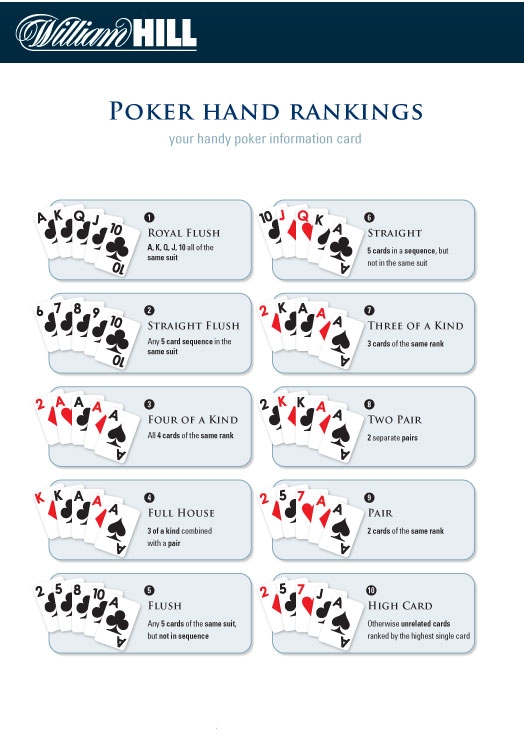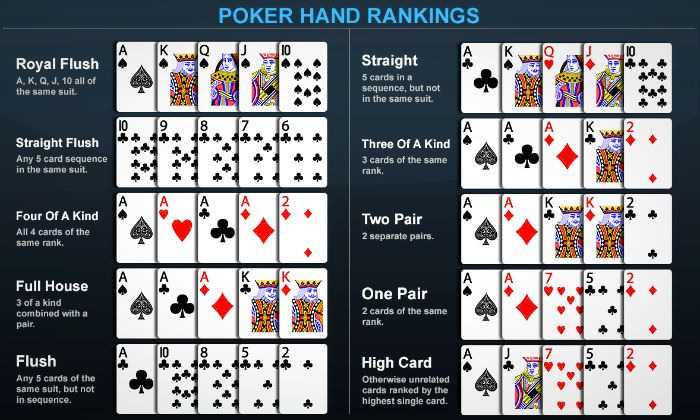All Texas Holdem Hands
Every beginning player, therefore, needs to understand the poker hand rankings to determine the strength of each player’s hand and, subsequently, the winner. In this guide, we present the Texas Hold’em hands order of value, from bottom to the highest hand.

Follow these hand charts and learn how to play your starting hands at Texas Holdem.
The charts below will give you a great starting point on how to play your starting hands. For all of you beginners, we recommend consulting these charts will playing online.
- Poker Hand Rankings Quiz. Put your knowledge of poker hands to the test with the quiz below.
- Poker Hand Rankings - Texas Holdem Starting Hands Chart. At the bottom of this page is a comprehensive listing of Texas Hold'em starting hands based on their EV (expected value). Expected value is the average number of big blinds this hand.

We provide 4 separate charts depending on where you are seated relative to the dealer. You can find out how to play the Blinds, Early Position, Middle Position, and Late Position.
After the flop, you can consult the Drawing Odds Chart at the bottom, but you will also have to develop your reads, pot odds and other skills to develop your post-flop strategies.
Play Texas Holdem at Americas Cardroom! Open a new account and redeem the Americas Cardroom bonus code WELCOME100 for up to a $1,000 bonus!

Hands In Texas Holdem
How to Read the Starting Hand Charts
Let’s look at some examples of how to use these poker odds charts…
| Early Position 88 77 | Unraised Pot Call 1 | Raised Pot Fold |
| * In early position, only call with A8s or 77 if there is already at least one caller in the pot. Fold if you are first in or if the pot has been raised. | ||
| Middle Position 98s | Unraised Pot Call 3 | Raised Pot Fold |
| * In middle position, only call only play 98s if there are already three or more callers. Do not call raises. | ||
| Late Position JJ TT 99 | Unraised Pot Raise 1, Call 2 Raise First In, Call 1 | Raised Pot RR 1 Option, Call All RR or Fold against 1 Player, Call 3 |
| * In late position, you should raise with JJ against one caller or first in, and call against two callers or more. You have the option of rerasing a lone raiser; otherwise, always call a raise. * Raise 99 when you are first in from late position; otherwise, call if the pot has not been raised. If the pot has been raised, you should either re-raise or fold when against a single player, or call if there are three players in the hand. | ||
Texas Holdem Card Combinations
| Blinds AQs AQ A9s KJ | SB Unraised Pot Raise 1 or 2, Call 3 Call Call | SB Raised Pot RR 1 or 2, Call 3 RR Lone Late, Fold Fold | BB Raised Pot Call (raise 1 or 2 limpers) Call Call 2, or 1 Late |
* In the small blind, you can raise or reraise one or two opponents with AQ, otherwise, call against three or more opponents. * In the small blind, always call A9s against limpers. If the pot has been raised, you should reraise a late position player. You should fold if the raiser is in early or middle position or against two or more opponents. * In the big blind, you can call with KJ against two opponents or a lone late player. Fold against a lone player from early or middle position. | |||
With a little practice, you should be able to find the appropriate poker strategy very quickly. I recommend keeping these charts open to provide guidance as you play. May the odds be with you! – Matthew Hilger
Ready to play some poker? Sign up to Americas Cardroom here!
Get the free Americas Cardroom download at http://pokercasinodownload.com/americas-cardroom-download-bonus-code/
If you also like Video Poker, learn perfect Video Poker strategy at VideoPokerStrategy.org. Check out the Jacks or Better strategy chart at https://videopokerstrategy.org/jacks-or-better-strategy/.
Texas Hold Em Hand
2 4 | |

